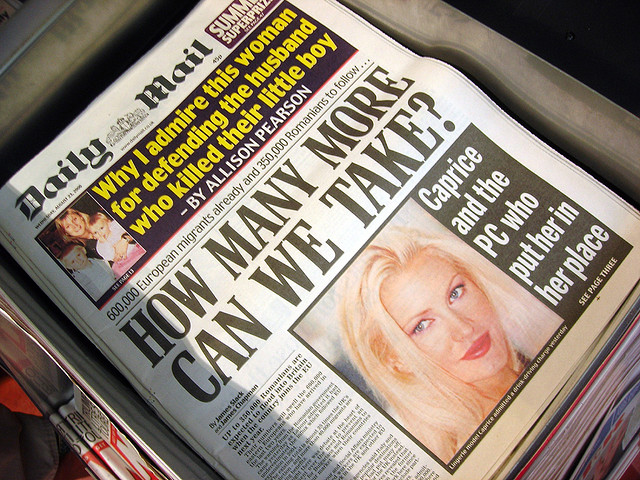European Court of Human Rights statement on ‘seriously misleading’ UK news articles
The European Court of Human Rights has long been a target of criticism from parts of the British press. In response to recent coverage of figures on payments made by the British government following Court decisions, the Registrar of the Court has issued a statement highlighting the misleading claims in certain articles, particularly in the Daily Mail. The statement is published in full in this post.

The European Court of Human Rights’ statement criticises recent press coverage of its decisions. Credit: Gideon: (CC BY 2.0)
Several British newspapers have this week published articles based on a table produced in Westminster in response to a written parliamentary question. The common theme of the articles is that judgements from the European Court of Human Rights since 1998 have caused the UK government to make substantial payments to successful applicants, the clear suggestion being that this constitutes a massive payout to criminals. The figure cited is £4.4 million.
However, the way in which this has been presented is seriously misleading. First, the figure of £4.4 million includes legal costs as well as compensation. The calculation of the total paid in respect of compensation by the UK since 1998 (as opposed to compensation and costs taken together) is in fact in the region of £1.7 million, less than half the figure of £4.4million.
The failure to distinguish between compensation and costs creates the impression that applicants were awarded significantly more compensation than they really were and that the sums indicated were for the applicants’ sole benefit. For example, one of the articles suggested that Mustafa Abdi “pocketed £7,237”, whereas in reality he was awarded €1,500 in compensation. It is also indicated that applicant Douglas Vinter was “awarded £34,500”, although he was accorded no compensation whatsoever, the sum cited relating solely to costs and expenses.
A significant proportion of the amounts referred to were therefore paid to lawyers. The particularly high level of legal fees in the U.K. compared with other Council of Europe countries means that in British cases costs normally exceed compensation. One example would be the case of Financial Times and Others v. the UK in which the Financial Times, the Independent, the Guardian, the Times and Reuters were awarded a total of €160,000 in costs, but received no compensation.
The articles also imply that the sums in question were invariably paid to criminals. According to one headline “Judges in Strasbourg paid out £4.4 million to some of Britain’s worst criminals”. It is simply not true to suggest that all the applicants in respect of whom the Court has found violations since 1998 were criminals.
For example, Mr McElduff and his fellow applicants (in Tinnelly and Sons and Others and McElduff and Others v. the UK) were self-employed joiners who were blacklisted from public works contracts because they were catholics, A. (in A v. the UK) was a 12 year old boy who was assaulted by his step father, the Osman family (in Osman v. the UK) the widow and son of man murdered by a stalker and David and Carol Glass (in Glass v. the UK) a disabled child and his mother.
The calculations were based on the figure of 202 cases “lost” by the United Kingdom over this period (a figure described as “staggering” in one article). That figure has to be set against the total number of applications brought against the UK over the same period, namely 13,515. In other words the cases “lost” represented 1.5% of the cases examined.
Finally, some of the articles cited a familiar refrain that “because they are political appointees many of the Court’s judges are not even legal experts”. This is simply not the case. Judges are not appointed but elected by the Parliamentary Assembly of the Council of Europe, composed of delegations from national parliaments, including Westminster. A list of three candidates is put forward by the Government, but before the Assembly proceeds to the election the list is vetted by an independent international panel of senior judicial figures to ensure that the candidates satisfy the Convention criteria that they must “either possess the qualifications required for appointment to high judicial office or be jurisconsults of recognised competence”. In other words they must be shown to be ‘legal experts.’ The judges on the Court come from different professional legal backgrounds, judges, academics, practitioners, but there are absolutely no grounds for alleging that they are not legal experts.
The Court naturally understands that some of its decisions in sensitive areas give rise to criticism. The operation of the rule of law will not always tally with public opinion and it would be surprising if all its judgments were popular with governments.
However, it is concerned about the frequent misrepresentation of its activities in the British media, the confusion between the costs (awarded in all properly functioning judicial systems) and compensation being one example of how a distorted picture of the Court’s decisions and work has been put forward.
Note: This post represents the views of the author, not those of Democratic Audit or the London School of Economics. Please read our comments policy before commenting. Shortlink for this post: https://buff.ly/17oTDaO





 Democratic Audit's core funding is provided by the Joseph Rowntree Charitable Trust. Additional funding is provided by the London School of Economics.
Democratic Audit's core funding is provided by the Joseph Rowntree Charitable Trust. Additional funding is provided by the London School of Economics.